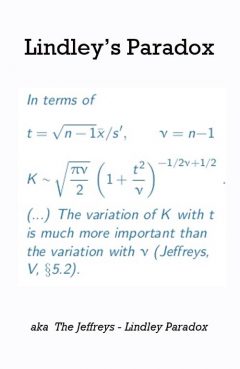Lindley's Paradox

Release Date: //1957
Country of Release:
Length:
MPAA:
Medium: Paradox
Genre:
Release Message: Tiny errors in the null hypothesis are magnified when large data sets are analyzed, leading to false but highly statistically significant results. Authored by Dennis Lindley.
Description: Lindley's paradox is a counterintuitive situation in statistics in which the Bayesian and frequentist approaches to a hypothesis testing problem give different results for certain choices of the prior distribution. The problem of the disagreement between the two approaches was discussed in Harold Jeffreys' textbook;[1] it became known as Lindley's paradox after Dennis Lindley called the disagreement a paradox in a 1957 paper.[2] Although referred to as a paradox, the differing results from the Bayesian and Frequentist approaches can be explained as using them to answer fundamentally different questions, rather than actual disagreement between the two methods.